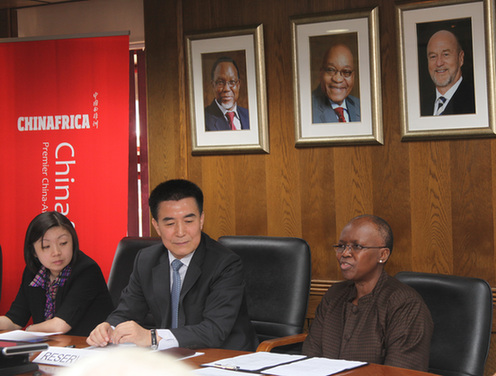|

Wang Ercheng, Deputy Minister of the Organization Department of the CPC Central Committee (center), Professor Phindile Lukhele-Olorunju, CEO of AISA (right), at the China-Africa Exchange Forum in Pretoria on February 21
China's recent raft of reforms passed at the Third Plenum of the 18th Central Committee of the Communist Party of China (CPC), held in November last year, were explained in some detail to an audience of academics, diplomats and business people in Pretoria, South Africa, on February 21.
The decision to carry out the latest set of comprehensive accelerated reforms came on the back of reforms that began 35 years ago, said Wang Ercheng, Vice Minister of the Organization Department of the CPC Central Committee, at the Second China-Africa Exchange Forum, co-hosted by ChinAfrica Media and Publishing Ltd. and the African Institute of South Africa (AISA).
He told the forum that where in the past, reforms in China had been made in specific areas only, the current comprehensive reform process applies across the board in social, political, economic and ecological areas as well as Party building.
Despite past reform success in the political and social sectors, as well as in improving people's livelihood, contradictions have been encountered along the reform path and those contradictions need to be resolved for China's future development. Wang said there are several challenges facing China's reform policy, noting among these are the lack of technological and scientific innovation, the widening urban–rural income gap, inefficient development, environmental degradation, social safety concerns and corruption.
Wang admitted that "without overcoming these and other challenges China cannot have proper development in the coming years," adding that implications of the reform were important for the rest of the world as well as China.
"The CPC has set two grand centenary goals, the first of which is to build a prosperous society in all respects by 2021 when the CPC celebrates its 100th anniversary. The second goal is to build China into a middle-level developed country by 2049, when the People's Republic of China celebrates its 100th anniversary," he said.
By meeting these goals China will realize its dream of rejuvenating the nation and in the process contribute more to peace and development in the rest of the world. Removing the obstacles to this dream is therefore paramount.
The overall objective of this reform is two-fold - the further improvement of the socialist system with Chinese characteristics, and further promoting good governance in China.
In breaking down the specifics of the reform, Wang noted six key areas - economic, political, culture, social governance, ecological and establishing a leading group to carry out the reform. Chinese President Xi Jinping will head up the leading group, indicating the emphasis China is placing on the process. Of the key areas outlined, economic reform was the priority, as it impacts all the other areas.
Wang said the CPC has a clear vision of what needs to be reformed and what does not, adding that reform should be based on national realities and carried out step-by-step.
China's reforms have implications for the rest of the world, including Africa, as balanced development means more opportunities for China and other countries, in market and investment areas. As the world's largest manufacturing base and market, China has a dual responsibility and is in line to become the engine driving the world's markets.
Apart from attracting investment, Wang said China is now also becoming an outbound investor in other countries, most notably in Africa. However, he said it is important to remember that despite China's achievements, it is still a developing country, as is the African continent.
Professor Phindile Lukhele-Olorunju, CEO of AISA, said China's intention to cooperate with Africa and its specific time frame for the reform process are indicative of its deep commitment to developing the country.
And just as that development is leading toward the Chinese dream, the people of Africa also have a dream. Professor Garth Shelton, from the International Relations Department of Wits University in South Africa, told the forum that in the spirit of cooperation, Africa is willing to help China in reaching its dream through guaranteeing supplies of raw materials, having open trading channels, supporting China in global organizations and welcoming investors to a continent that has a stable environment.
In return, he said Africa needs China's help to realize its own dream and address unemployment. To make this happen, Shelton suggested the imbalance in trade be addressed, with help needed to access China's vast market, specifically in the agricultural sector. Shelton said increased Chinese tourism and investment, in the form of economic development zones, along with China's assistance in peacekeeping on the continent, would go a long way to make the African dream a reality.
Wang agreed that the trade imbalance between China and Africa is a fact, saying China's role in the African dream is to strengthen trade. He said that in the future, he believes China will import more from Africa as the continent develops and the imbalance in trade will be gradually resolved. Both sides must pin down the specific practical areas of potential for future cooperation, and as China wants to see more rapid development in Africa and the two are facing common challenges, Wang suggests better use be made of the Forum on China-Africa Cooperation to address these challenges.
The China-Africa Exchange Forum is the second in a series of forums co-hosted by ChinAfrica Media and Publishing Pty Ltd. and publisher of ChinAfrica magazine, aimed at promoting deeper cooperation in all spheres of the China-Africa relationship.
(Reporting from Pretoria)
|